
Dear Friends,
The year in review feature is generally an easy column for the Director to write. As the title suggests, I look back with a sense of pride and satisfaction at a year of successful events, celebrate our guest speakers who sparked insightful conversations, and chronicle our community-building activities that strengthened our bonds as feminist scholars on campus. This year suspends all expectations. I even tried to find a "natural" point of pause to begin this retrospective. There simply wasn't an end to the daily onslaught of misery in these times.
So, let's start at the beginning. I became the Director of CSWS in 2016. It was a momentous year: We lost our founding mothers Joan Acker and Sandi Morgen in 2016. Voters installed Donald Trump as the 45th president of the United States soon thereafter. Now, I close out my term as director in another election year when, as we are told, the battle for the soul of the nation is at stake. CSWS has always responded to the urgency of the moment in which we live and will continue to do so. In the throes of COVID-19 and its onslaught on the most vulnerable members of our community, in the midst of racial injustice and state-sanctioned killing of black people, and in the face of the expectation that our Latinx and immigrant communities will continue to bring fresh food to our tables notwithstanding the dangers they face, we are here bearing witness.
Last year, as we planned the Lorwin Lecture Series and other talks on the theme of Gender, Power, and Grief, we invited scholars who delved deeply into maternal grief, feminist activism, new approaches to the black archive of travel and belonging, and the global convergence of poverty, trafficking, and migration. As the Review shows, we had a wonderful group of activities and speakers before we shut down in March, and I encourage you to peruse the pages and take comfort in the pictures that remind us how integral you all are to our community.
During the initial stages of the shutdown, COVID-19 instantly revealed the structural inequities and vulnerabilities of parents and caregivers among our staff, faculty, and GEs. We immediately launched a Caregiver Campaign to call attention to the differential impact and stressors that parents, other-mothers, and caregivers of elders faced. My heartfelt thanks to all who contributed to this campaign. It has impacted many on our campus and beyond, and colleagues at other universities have taken our list of strategies to their own administrators with mixed results. Ultimately, we have succeeded in raising awareness of these issues in conjunction with our academic counterparts from all over the country. It is my fervent wish that the humane and just policies that we advocated for remain part of the institutional plan for the future of the academy beyond COVID.
Another personal milestone for me this year has been to encourage us all to slow down and pause. We canít keep replicating a pace that killed our souls with overwork and imperiled our planet. We risk being duped by the fact that all our scholarly engagement is now virtual, so we can do more. More events on Facebook or Instagram Live. More Zoom book talks. More webinars. It is a collective response to trauma to bury ourselves in busywork and act like everything is almost normal. Donít do it. Slow down. Our ancestors slowed down the grueling pace on plantations. They didnít just burn the sugarcane fields. More often, they misplaced tools, broke them, worked slower, and there was nothing the overseer could do about it. Let us learn from our ancestors. They were not weak. They were strong. And they deployed their weapons.
What does the coming year look like? To replace our regular programming, we have developed a new podcast series called The Kitchen Table, with myself and our former colleague Shoniqua Roach as hosts. The Kitchen Table features the voices and meditations of feminists as we think through a black feminist care ethic in the time of COVID-19. The podcast series draws on our legacy of Kitchen Table: Women of Color Press, and reminds us that the location of heartfelt conversations and truths emanate from the heart of the home: the kitchen. It also honors a tradition of those who cook, nourish, and feed the revolution. I hope you will join us as we honor that spirit of truth telling and ethical conversation around the kitchen table.
In the spirit of pause, we have no events planned this year. We will of course continue to schedule Noon Talks to support graduate students who need to practice job talks and build their vitae. We also will continue our Works in Progress for those seeking feedback on drafts and proposals. We will continue to build our Research Interest Groups (RIGs), expand our support for research and teaching relief, and act as a germinator for ideas that you are passionate about. But right now, letís gear up for the coming months and use our collective rage and sorrow to build a better and more just university, community, nation, and world. Our future and our childrenís future depend on it.
- Michelle McKinley is the Bernard B. Kliks Professor of Law and director of CSWS.

